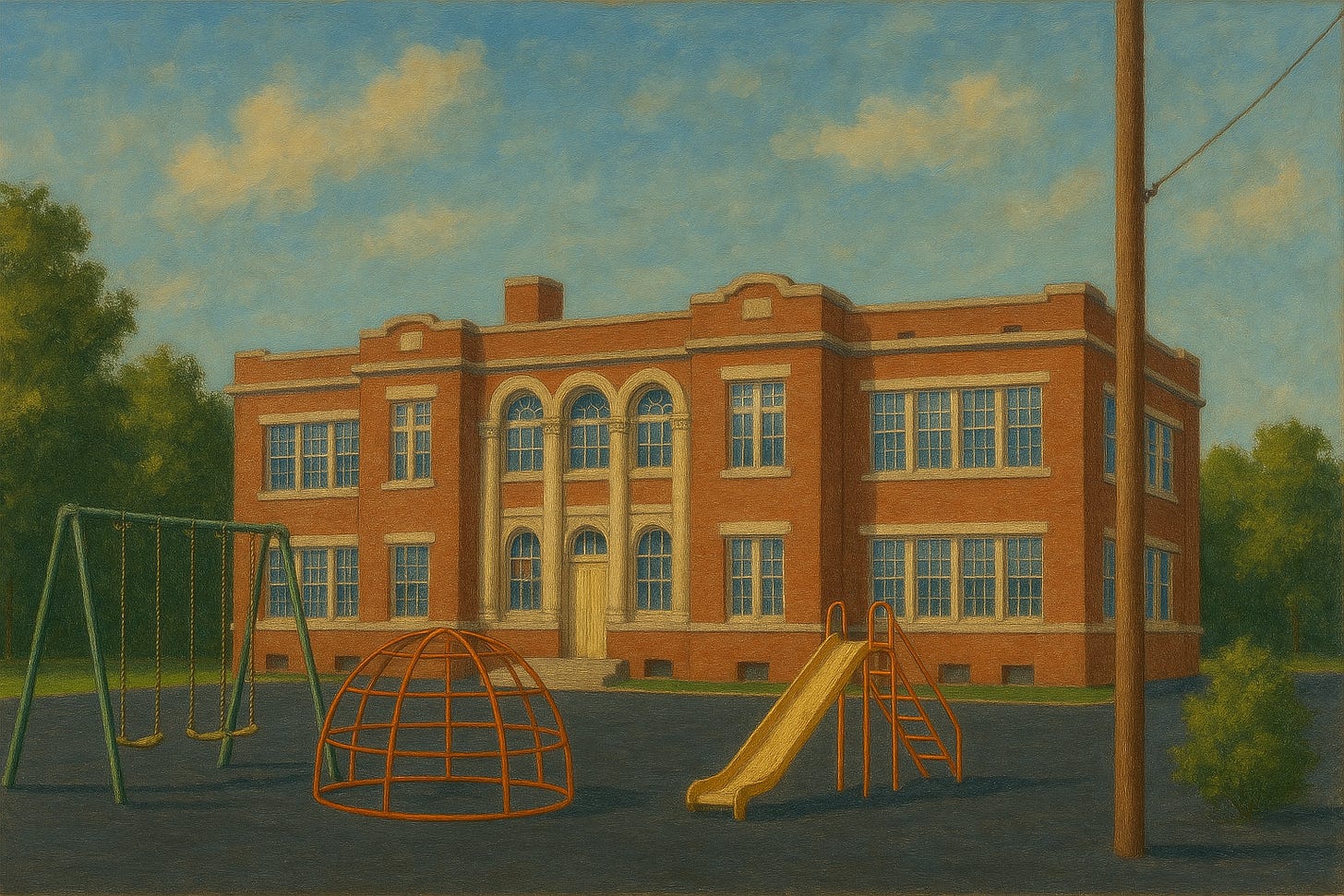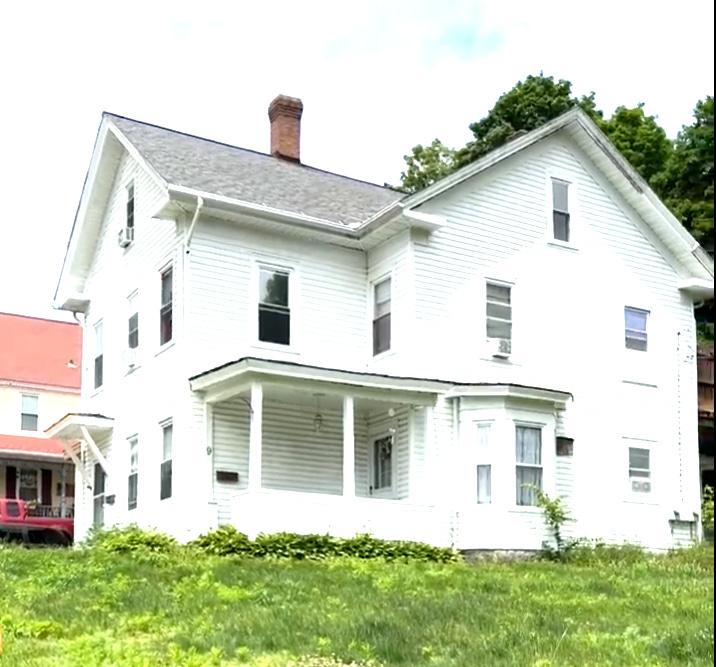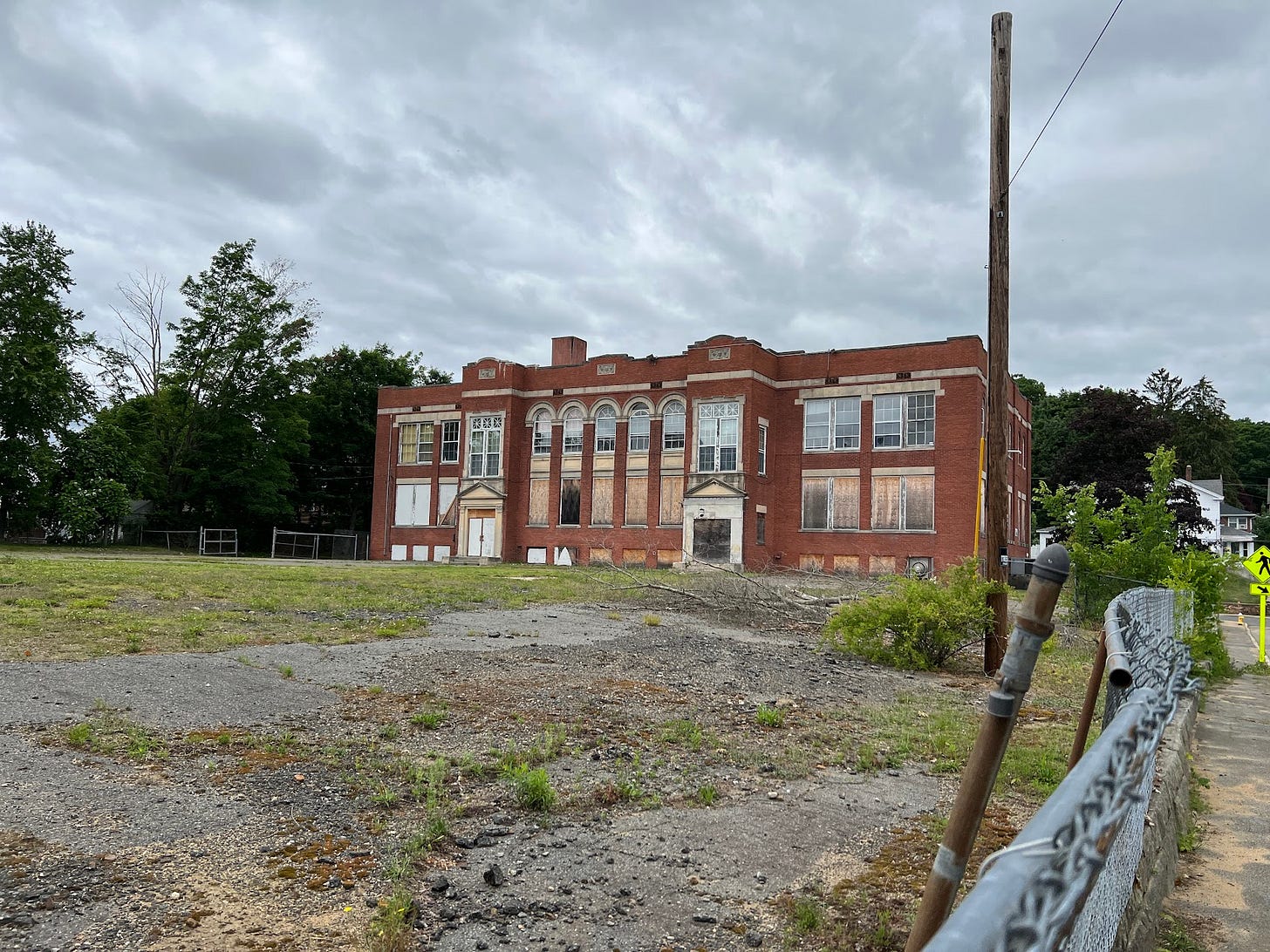Stafford, 1983
Note: this is part of a series of memoir-reflections I’m putting together of places I’ve lived or spent time over the course of my life. This is not just an exercise in storytelling, but a practical means to retain these experiences, as I’ve noticed that my memories of many things are fading now as I age, the details worn down like the face of an old coin, and I want to capture them before they’re lost.
If you enjoy this post, please consider signing up to be a paid subscriber, or making a contribution in support of great writing at Buy Me A Coffee or my Paypal. Writing is my profession and my passion, and your support makes it possible for me to do this work.
I have never even liked BLTs. Still don’t. I like the individual ingredients well enough, but the whole is somehow less than the sum of its parts. There is always a disappointing texture mismatch between the bread, the lettuce, the tomatoes, and the bacon. Airy gaps where there should be substance. But that summer, I was given an ultimatum: I either ate the sandwich, or I would have to stay home from the movie.
And I was not missing Return of the Jedi for anything. Not even a sandwich I hated.
My mother had been pregnant with me when the first Star Wars movie came out, in the summer of ‘77. The first time I heard Darth Vader’s voice, or the sound of a lightsaber, it came to my ears muffled, filtered through flesh and bone and the bubble of amniotic fluid in which I hung suspended.
When Empire Strikes Back came out in 1980, they were expecting my brother Matt. I was a toddler who couldn’t sit still, busily climbing under my parents’ seats and in and out of the folding chairs. But I remember looking up at that endless expanse of silver screen, and watching in awe as the Battle of Hoth played out in all its snowy glory.
For Return of the Jedi, my mom was pregnant with my sister Erin. If you’ve noticed a pattern, I would later joke that my parents practiced “Star Wars Family Planning,” but in an extended family where every couple I knew was always having babies, it all just felt normal to me at the time. What mattered was that I was finally of age. I was 5, going on 6, and you couldn’t have kept me from that theater with strong ropes and chains. I was so excited all day I was practically vibrating. The butterflies in my stomach made me a bit nauseous, which didn’t help that damn sandwich go down. I stood on the sidewalk in front of my uncle’s house, the evening sun filtering gently through the summer leaves, waiting for my parents to finally get in the car and take me to the theater. Having to wait an entire day had been like a kind of drawn-out torture, the hours passing with excruciating slowness.
When at last the time came, I was transfixed by the movie, but the nerves of the day and my overly-sensitive stomach meant I very nearly lost my dinner when the scene where Leia chokes Jabba left him flailing his slime coated tongue around, making gurgling noises that had me gagging. My mom had to camp out with me in the restroom until it passed. It was embarrassing.
That Christmas, my dad spoiled us with film-related toys: action figures of Boba Fett and Darth Vader, a large Rancor with a fully articulated jaw, a speeder bike that actually exploded into pieces at the press of a button, and a Wampa whose large, jointless arms could be pulled out of their sockets, where they were held fast only by a taut rubber band.
It was the year I would start kindergarten, at the Borough school in Stafford Springs, a building like a brick castle that sat atop the hill two blocks above the Lovecraft-green-shingled Folk Victorian we lived in, up at the top of the the steep wooden staircase I fell down one night when I went walking in my sleep.
Our neighbors downstairs would always complain about all the thumping from us kids running around, so my brother Matt and I would crab walk the chair rail down the hall, our heads scraping the ceiling, until my mom would scold us for the dirt we were leaving on the paint.
I would spend the next six years walking that same sidewalk to that same playground at that same school, whether morning dew glistened on the green grass or ice and snow coated those steep, hilly streets. In the cool mornings of Connecticut autumns, I’d try to get there early enough to get a spot on the big swings. The old kind with the tall frames made of galvanized steel poles, ropes of chain link dangling from the top, strapped together at the bottom by a half-inch slab of thick black rubber. I would wrap my fingers tight around the metal until my knuckles hurt and my hands stunk like old pennies, closing my eyes until I was at the apex of my swing, then opening them to peer up at the clear blue sky through the canopy of leaves just as my momentum shifted back, imagining myself falling from some immeasurable distance above.
At night sometimes I would dream that I was really flying, past the chain link fence that enclosed the schoolyard and down the sloping field beyond, soaring just a few feet above the ground at breakneck speed as the wind whipped through my hair.
On one particularly stormy morning, the wind was so strong on my way to school that I had an epiphany. I began timing the gusts, jumping into the air as high as I could, letting the gale turn my umbrella into a parasail. I would float on those currents of rough air, gliding half a dozen feet at a time like Mary Poppins. Or at least, I did until the whole umbrella turned inside out, the spokes snapping like brittle bones.
My mother was not amused when she saw the tattered remains. It was her umbrella.
Another morning, the streets were covered in a glaze of black ice. I walked up the hill alone, as I always did, but this time slipping and sliding and falling over and over again. When I arrived at the top of my road, preparing to cross the street to the sidewalk that ran up to the school, a passing car slowed to a stop.
“Hey kid,” the driver yelled. “Didn’t you hear? School is cancelled today!” I was elated at the day off, but my slip and slide back down the hill to my house left me wondering if I could even stop when I got to my driveway.
In my kindergarten class, I would call a pretty little brunette girl named Chrissy my first “girlfriend.” I had no idea what that consisted of, but I knew it was over the day I was playing on the floor and she sat on my head with her fuzzy green terrycloth shorts. The indignity of it all!
One day, when it was my turn to hold the door on the way back from lunch, another girl, named Holly, who everyone thought was gross, kissed me on the lips as she walked by me. It was wet and soft and deeply unpleasant, and no amount of wiping my mouth made the sensation go away. I was sure, at that moment, I never wanted a girl to kiss me again. I’d spend the rest of that year holding my bright yellow Garfield lunchbox by my head any time I walked by her, just in case. Later, on the playground, while I left that same lunchbox unattended, someone would use a rock to scratch the entire picture off the front of it. I wonder if it was her.
That was the playground where I’d pick up the girls I thought were pretty, lifting them squealing into the air to prove my strength, until the screams got too loud and I would let them go and run away. It was where a boy named Paul, a stocky blonde kid with coke bottle glasses, punched me in the stomach because of something I said. He hit me so hard I couldn’t breathe, and thought for a moment I might be dying. It was where my friend Ryan got a tiny cut on his head that bled so profusely he looked like he’d escaped from the set of a slasher film. Unfazed, Ryan ran around with blood gushing down his face, scaring all the girls.
In ‘85, when Hurricane Gloria struck, I was sent to back down the kindergarten wing to eat ravioli as my parents were dispatched to come pick me up. My mom took me home, where my dad was busily taping the glass panes on the antique windows. The storm was powerful, unlike any I’d ever seen, and when the eye finally passed over, my dad took me out to walk the town and see the damage, over my mother’s worried objections. We dodged downed powerlines and fallen trees, and could feel the pent up energy of the storm hanging in the uncanny, temporary stillness. My dad, often serious, angry, and aloof, had a childlike energy and sense of wonder as we walked together, taking in all the destruction, sturdy old trees pulled out by their roots everywhere we went.
One day, near the end of the 3rd grade, I made a wish that the teacher I was due to have next year, with her long fingernails and unkind face, would just die so I wouldn’t have to be in her class. That summer, she actually did die, and I felt like maybe it was my fault.
I got a worse teacher than her for 4th grade anyway. She was fat and ugly and had a horrid New England accent. A woman whose naked dislike of me manifested in blatant unfairness she thought I was too young to notice.
That 4th grade playground was where some of the boys, myself included, would gather around and listen to a pudgy little boy named Tim regale us with stories about the porno movies he’d found under his dad’s bed, describing things I couldn’t even begin to visualize, because I had no frame of reference for them. I was morbidly curious and more than a little grossed out. But my mother had been forced to have “the talk” with me in 2nd grade, because a boy named Nathan with a rat tail wouldn’t shut up about sex at the lunchroom table.
In the summers, we’d ride bikes around the sidewalk that encircled the house, and climb the big sturdy maples in the front and the side yard. (I jumped out of one into a pile of leaves one fall, thinking it would cushion the impact, and ended up knocking out my front tooth.) We tunneled like rodents through the lilacs and the forsythias, building traps to guard our forts or spying on the neighbors next door. There was an old green barn out back, the rotting wood of the main-level floor smelling richly of dust and old motor oil. The strange, quiet, hulking man who lived downstairs and looked like Frankenstein was named Hector, and he used that barn to store his classic, deep maroon Pontiac LeMans, which he would take out and meticulously wash and polish on the weekends. In the barn loft, there was an old blue mattress, bare of any sheets or bedding, and we never gave a second thought to the real reasons Hector’s teenage daughter and her boyfriend probably put it there. To us, it was nothing but a wrestling ring, where we’d fight out scripted battles as we played the roles of made-up characters I’d draw out on pieces of loose leaf paper. We played with fire in the the crawlspace beneath the barn, burning wasps and melting plastic and somehow not setting the whole decrepit structure alight.
In the wintertime, we’d tunnel through snow banks left by the plow, or sled down the sloping side yard, trying to get enough momentum to make a solid jump off the rock retaining wall at the bottom into the street below. Invariably, someone would yell at us about not playing in the road. Invariably, we would ignore them.
One year, the snow in the back froze so solidly that you could actually walk on it without breaking through the crust. We finally found a use for the roll-up sleds — they called them Flexible Flyers — my mom had gotten us a couple years prior. They were little more than a thin sheet of blue plastic with hand holds cut out of the top. They were utterly useless in normal snow, but lightning fast on the ice. I waited my whole life for another opportunity to sled on snow that slick, and never got one. (For the regular snow, it was the red plastic toboggan or bust.)
When I’d visit my friend Matt’s house at that time of year, we’d watch movies or play computer games while his dad brought in buckets of maple sap from the leafless trees out back, and boil it into syrup on the old wood stove. When we’d play outside, we’d come in, and shake the snow from our mittens on the hot cast iron, watching it sizzle and melt as the heat flushed the cold skin of our cheeks. On one snow day, I was so desperate for something fun to do, I put on a snowsuit and walked the five or so miles across town, most of it uphill, to Ryan’s house, because my mom said she couldn’t drive me because of the roads. I have no idea why she let me go, but that walk must have taken at least two hours, and about half-way there, I thought it was the dumbest thing I’d ever done. Ryan’s mom gave us hot cocoa with Fluff instead of marshmallows, and we played ColecoVision and Commodore 64 in his basement until one of his parents offered me a ride back home.
The house I grew up in there on Fiske Avenue is almost unrecognizable these days. The structure is the same, but instead of hideous green shingles, it’s been re-sided and painted white. The two best climbing trees in the yard have been cut down, and the barn, deathtrap that it was, has long-since been demolished. For all I know, it finally collapsed. When I try to find my childhood home on Google Maps, the street address doesn’t even come up, so I have to drop my pin downtown, turn on street view, and navigate my way home as though I’m back there, on my bike.
I haven’t lived in Stafford Springs since 1989, but not much has really changed. I lived on those streets, riding my bike until dark, walking to the Cumberland Farms behind the railroad tracks downtown to buy candy, or going to the red brick library to lose myself in the books. One summer I went every single day to the appliance shop down on main street. Every few days, I’d bug the old man who owned the place, buried behind a sea of clutter and old machines, to see if he had any refrigerator boxes. I was determined to get one and turn it into an epic fort. He would always tell me to check back later, and maybe he would. But he never did.
My school at the top of the hill is abandoned now; boarded up, the playground stripped of equipment, the beige modular buildings that comprised the kindergarten wing long-since removed. To stand there, looking through the fence, is like staring into a ghost town full of memories, various scenes playing out in various places along the cracked and heaving asphalt. Most of the blacktop is also gone, scrubby green grass pushing through to reclaim its turf.
The eight or so years I lived in that little town was the longest I ever lived anywhere, and it was synonymous with childhood for me. When we moved back to New York after my youngest sister was born in ‘89, I was nearly 12, and no place ever felt like home again. No place was ever my place, where every street and back alley and corner store and climbing tree was mapped out in my mind. The town we moved to from there was small and rural, and we lived near the top of a dead end road. There were never any kids my age to play with in my neighborhood, if you could even call it that, and I was thrust into the ugliness of middle school with a group of kids who had grown up together and had no interest in allowing me into their world.
I tried. I developed a foul mouth and an aptitude for dirty jokes. I visited the homes of kids I met on the bus even though I didn’t really like any of them. I had crushes on girls who wouldn’t give me the time of day. I spent countless days in after-school detention, usually because I was running my mouth trying to make people laugh. I played football in 9th grade, and it was probably the only thing that ever earned me any respect. Turns out being bigger and stronger than the other boys has its advantages, at least some of the time. But the next summer, I got a job instead of going to football camp, and a year later I decided to give homeschool a try.
I hated it.
But then I went to Dallas, in 1995. And while I never found home again, I did find friends. Better ones than I had ever had.








